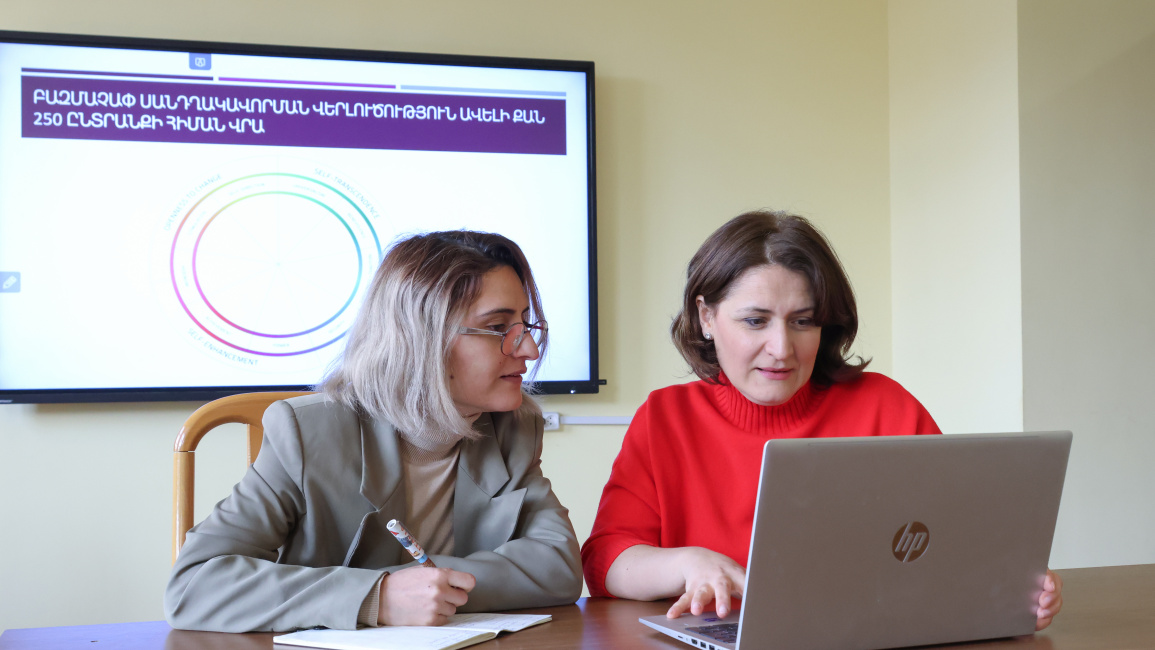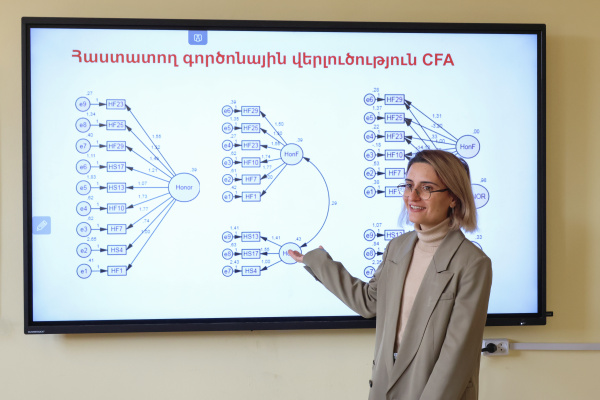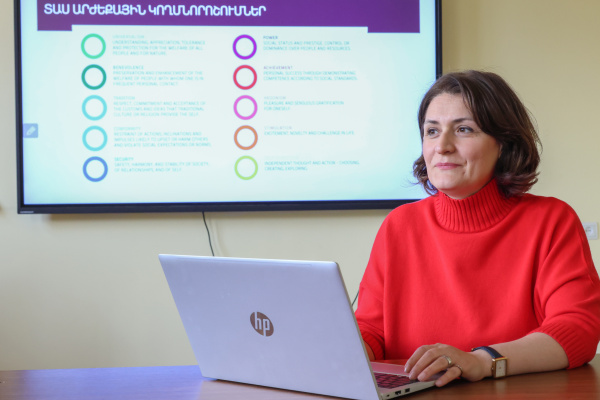April 29, 2024 | 15:00
Science
Education
Research
Study on human value orientations in the scope of psychologists’ research
As part of cross-cultural and intra-cultural research projects, the research team of the Research Laboratory of Personality and Social Environment is conducting a study on value orientations of "dignity", "honour" and "not losing face".

This approach to the study of values has recently emerged within cross-cultural psychology. It was proposed as an alternative to the traditional dichotomous approach, specifically the collectivist-individualist division of cultures. This approach is an attempt to describe societies focusing on two primary problems: how is a person valued within society and how are social relations regulated in these environments?
"Cross-cultural studies started in 2016-2017 initiated through the cooperation with Professor Peter Smith from the University of Sussex (England) (coordinator: Anna Hakobjanyan). Peter Smith is considered one of the most prominent scholars in the field of studying these value orientations. As part of the cooperation, in 2021-2022, we conducted the second cross-cultural research in cooperation with the same professor (coordinators: A. Grigoryan, A. Hakobjanyan). Alongside these projects, we delved into four continuous intracultural studies, as a result of which the questionnaire for measuring value orientations was developed and localized in Armenian," emphasized Ani Grigoryan, Project Co-Leader and Researcher at the Laboratory of Personality and Social Environment of YSU.
In cross-cultural studies, it is customary to characterize the aforementioned value orientations as follows.
In the culture of "dignity", a person is considered an absolute value, which is inalienable. Regardless of their place and position in society, every person deserves respect.
In the culture of "honour", a person's value is determined by social relations; they have inherent value, but this value must also be acknowledged and appreciated by society.
In the culture of "not losing face", a person's value depends exclusively on their place and position in social relations. Different societies exhibit varying degrees of emphasis on these values, and within the same society, intracultural differences in their expression may exist.
Ani Grigoryan and Narine Khachatryan conducted intracultural studies.

"This is a research focused on studying value orientations. There are different approaches to understanding cultures worldwide. Cultures that are more collectivistic or individualistic. It was interesting for us to understand the expressions of these values, how people understand them and make sense of them. And we started with the validation of an instrument measuring these three value orientations. On our initiative, we conducted several studies of a quantitative nature. We conducted each survey among about 200-300 people and as a result of different types of analysis, we found out that the values of honour and dignity in our culture have two sides of self-expression," said Ani Grigoryan.
Through these works, the team also highlighted the specifics of the expressions of value orientations for our society. The values of honour and dignity have two aspects. Firstly, there is a group-oriented aspect focused on interpersonal relations and family (when individuals prioritize maintaining the reputation and honor of their family). Secondly, there is an individual-oriented aspect focusing on maintaining personal honor, which can lead to certain competitive relations and serves as the foundation for a new conceptualization of these values.

"The finding related to the value of dignity is a novelty in cross-cultural psychology, and such results have not yet been published even by foreign researchers. We discovered that dignity is not associated with self-centered values or personhood but with other-oriented values, such as willingness or universalism. When we discussed these ideas with our colleagues, it turned out that concurred. In other studies, they had encountered the phenomenon of "bifurcation" of the same dignity value, but they had not encountered that dignity itself is bifurcated," suggested Narine Khachatryan, Head of the Chair of Personality Psychology at the YSU Faculty of Philosophy and Psychology, Candidate of Psychological Sciences and Associate Professor.
A. Grigoryan presented a report summarizing the results of this research at the 27th Regional Conference of the International Association for Cross-Cultural Psychology held in Limerick, Ireland (27th Regional Conference IACCP, 2023).
Narine Khachatryan will present a report on dignity at the European Conference on Personality (ECP21) to be held in Berlin in August of this year.
The team is currently working on research at an international level and conducting a validity check of the instrument for measuring these value orientations across diverse cultures. This work was achieved as a result of cooperation with an international team; the team won a prestigious grant program in partnership with the Psychological Science Accelerator and funded by the John Templeton Foundation. The grant program started in August 2023 and will continue until June 2025.
"Now, the team is actively engaged in developing the research methodology, with plans for data collection in more than fifty countries worldwide. Upon completion of the project, it is planned to publish an article in a high-impact journal with an international rating," said Narine Khachatryan.
It’s noteworthy that since the beginning of the studies of value orientations, team members, in collaboration with foreign partners, have published 3 scientific articles in a high-impact journal.

